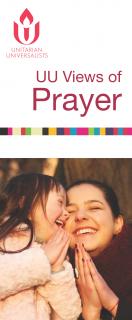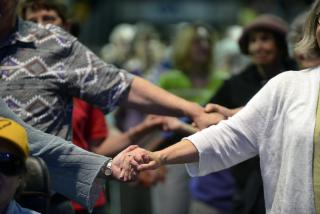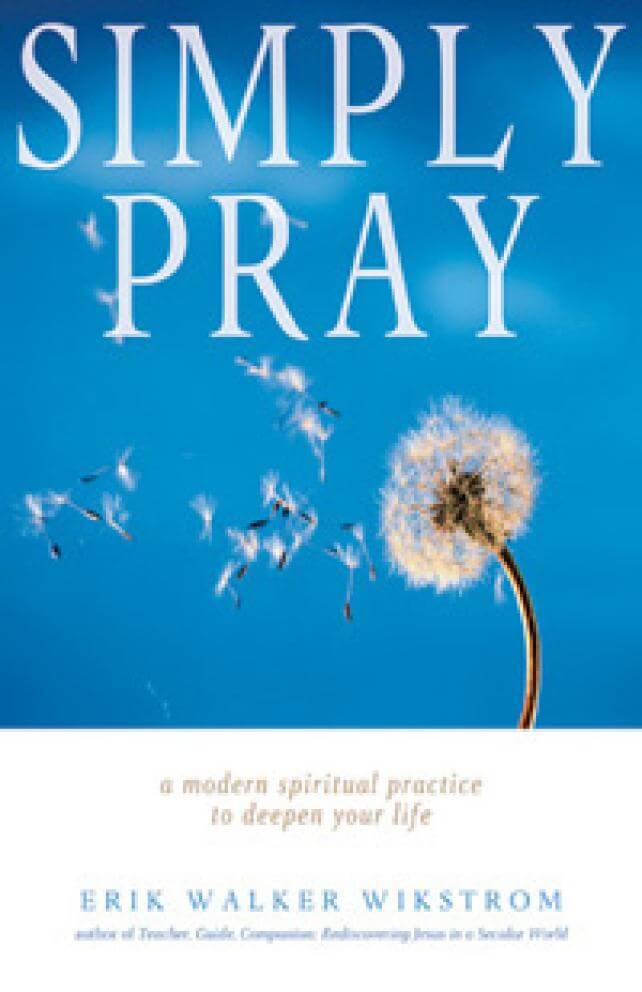UU Views of Prayer
By Erika Hewitt
UU Views of Prayer
Prayer is one word for the alignment of our full attention with our desire to connect with That Which Is Larger Than Us. It can take many forms, from the quiet cultivation of stillness to the deliberate naming of all that we’re grateful for, which Rev. Tom Schade calls “naming the goodness.”
Whatever its form, prayer also creates an internal shift. As renowned theologian Reinhold Neibuhr noted, “Prayer does not change things; prayer changes people, and people change things…. Prayer is not hearing voices, prayer is acquiring a voice.”
When it comes to prayer and meditation, how it works is less important than its practice. Prayer is a way to connect and reconnect to ourselves and to that which is life-giving; the mechanics don’t matter as much as the intention: remembering ourselves as magnificent, fragile vessels of love, sometimes with intimates and sometimes with strangers, and affirming our choice to remain connected so that we’re not lost in the vastness of space and time.
—Rev. Erika Hewitt, Editor
Prayer is not about leading the universe toward some desired outcome; it is about our willingness to be led to greater consciousness, compassion, and connection.
—Rev. Erik Walker Wikstrom
Thomas Jefferson Memorial Church Unitarian Universalist, Charlottesville, VA
I define prayer as kind, thoughtful and intentional conversations with the universe. My prayer might not change anything, but it helps me respond to the rest of the world in a way I didn’t before.
—Ronya Hobbit
Bismarck-Mandan Unitarian Universalist Congregation, Bismarck, ND
When I think of prayer, I think of continuity with all those who have offered prayers over time. I grew up seeing my mother pray her rosary daily. As a child I didn’t really understand it, but as I grew older I realized it allowed her a tiny space away from the commotion in her life. My mother’s prayer to us as we left her presence is stitched into my ordination stole, “Que Dios y la Virgin te acompañe siempre— May God and the Virgin (Mary) accompany you always.” Prayers are my touchstone. Regardless of what’s happening, in prayer I find my power. It brings me solace and sets me right again in my mind and heart. Prayer is the deepest longings of my soul manifested into words and actions.
—Rev. Marta Valentín
UU Church of Medford, MA
Prayers of gratitude focus my attention on the many blessings all around me, pedestrian and profound. Praying for the well-being of others in a Buddhist metta style of wishing what’s best for them opens my heart. Praying for people with whom I’m having difficulty is the best way I know to access my compassion and shift the energy between us. Sending blessings to people I pass as I drive to work—including the drivers who cut me off—reminds me that we are all connected.
—Rev. Sue Magidson
Affiliated Community Minister, UU Church of Berkeley, CA
I love the word prayer over meditation because the latter is often used to describe an emptying of one’s mind—and I’m looking to deliberately fill mine up. In understanding what I’m doing as prayer, I’m placing myself in the company of souls throughout millennia who also hoped, cried, were sickened with worry, loved desperately, and felt impossible levels of joy.
—Rev. Marisol Caballero
Faith Innovation Specialist, Faith Development Office, UUA
Prayer was foundational to my fundamentalist Christian family—and frequently about the fundamentals. So narrow was that narrow way, for me, that when I stepped off it I expected my prayers were forever unworthy. Still, that longing for marrow-deep connection would not relent, and led me to study devotional traditions once considered foreign or forbidden. How precious that study, when I became an interfaith hospice chaplain, companioning all manner of sojourner, including a devout Atheist who recited Whitman’s poetry as profoundly as any scripture. And so I learned to pray again, with no one right way, save yearning toward the Mystery my heart has always known.
—Rev. Amy Carol Webb
River of Grass Unitarian Universalist Congregation, Davie, FL
When I experienced a call to ministry, I felt a stirring and connectedness that I couldn’t fully articulate or understand. In one of my seminary courses, we spent the first portion of every class in centering prayer. In that silence I built a deeper relationship with the connectedness that had drawn me to ministry, a connectedness I often call God. My experience of prayer gives me an intimate place to bring my broken heart, my rage and thirst for justice, my deep gratitude, my joys and celebrations, my fears and anxieties. Our principles of respect, justice, curiosity, and lively community give my Unitarian Universalist faith wings, but prayer helps to give my faith deep and abiding roots.
— Rev. Sarah Napoline
First Parish Universalist Church, Stoughton, MA
Prayer is an intimate conversation with myself in all my vulnerability—facing fears that may be beneath the surface or staring me in the face. In prayer, I admit that I am powerless to shape the world to my desires and wants, but I have the power to choose to respond. Prayer grants me the courage to face the mistakes I’ve made and the harms I have caused others. Prayer exposes the bounty of my life for which I can be grateful.
—Michael Salwasser
Unitarian Universalist Church of Long Beach, CA
In going inward, prayer is an opportunity for mindful noticing of my fears, my dreams, my sense of gratitude. With that deeper noticing of my inner life comes the opportunity to name and share those parts of me, to invite others and the holy into deeper relationship with me. In reaching out through prayer to “all that is”—God, the universe, the vastness of time and space of which we are a part —I place myself in both a larger context and a larger relationship. I am a part of all that is, distinct yet inseparable, held yet free. I invite every atom, every molecule, everything seen and everything unseen, to bear witness and support me in my prayer.
—Rev. Manish Mishra-Marzetti
First Parish in Lincoln, MA
What prayer can do is help us to live consciously, honorably, and compassionately. As long as prayer helps me to be more loving, then I need prayer. As long as prayer serves a potent means of sharing my love with others, I need prayer.
— Rev. Kate Braestrup
Chaplain, Maine Warden Service
In times of need and inspiration I open up a “streaming” prayer channel—the baby has a high fever; the changing wind and the smell of cinnamon stir a sense of wellness in me; the cease-fire has lasted two days; the starfish are all dying and how can we all go on living on an earth without starfish?—and my message joins the smooth, silent static made by us little humans the world over as we tap into concepts we barely understand but that sustain us just the same: fierce and desperate hope, a search for what is right and true, and a whole-hearted embrace of the One whose breath fills our own lungs.
—Teresa Honey Youngblood
Religious Educator, Fayetteville, AR
For Reflection
Do you pray? If not, is there something you do regularly that someone else might call prayer?
What are some differences in how prayer is portrayed in media (fiction and nonfiction) and how prayer is practiced in your life or the lives of your loved ones?
The reflections in this pamphlet imply that prayer is a mode in which we cultivate tenderness and humility within ourselves. Has that been true in your experience with prayer?
Does the form of prayer matter to you? Why or why not? How might praying in a certain form or style affect your experience of prayer?
Imagine walking past a church, temple, or mosque with a public box outside inviting passersby to submit “prayer requests.” Would you write a prayer to put in the box? Would the denomination matter?
How does your personal history with prayer influence your current feelings about prayer?
Resources
- Prayers on WorshipWeb
- Kate Braestrup, Beginner’s Grace: Bringing Prayer to Life (Atria Books)
- L. Annie Foerster, For Praying Out Loud: Interfaith Prayers for Public Occasions (Skinner House)
- Erik Walker Wikstrom, Simply Pray: A Modern Spiritual Practice to Deepen Your Life (Skinner House)
- Purchase this Pamphlet for Your Congregation
Read UU Prayers
For Praying Out Loud Interfaith Prayers for Public Occasions
By Annie Foerster
Simply Pray A Modern Spiritual Practice to Deepen Your Life
By Erik Walker Wikstrom
Erik Walker Wikstrom reveals the universal qualities of prayer and offers a way to incorporate this spiritual practice into your personal journey...


